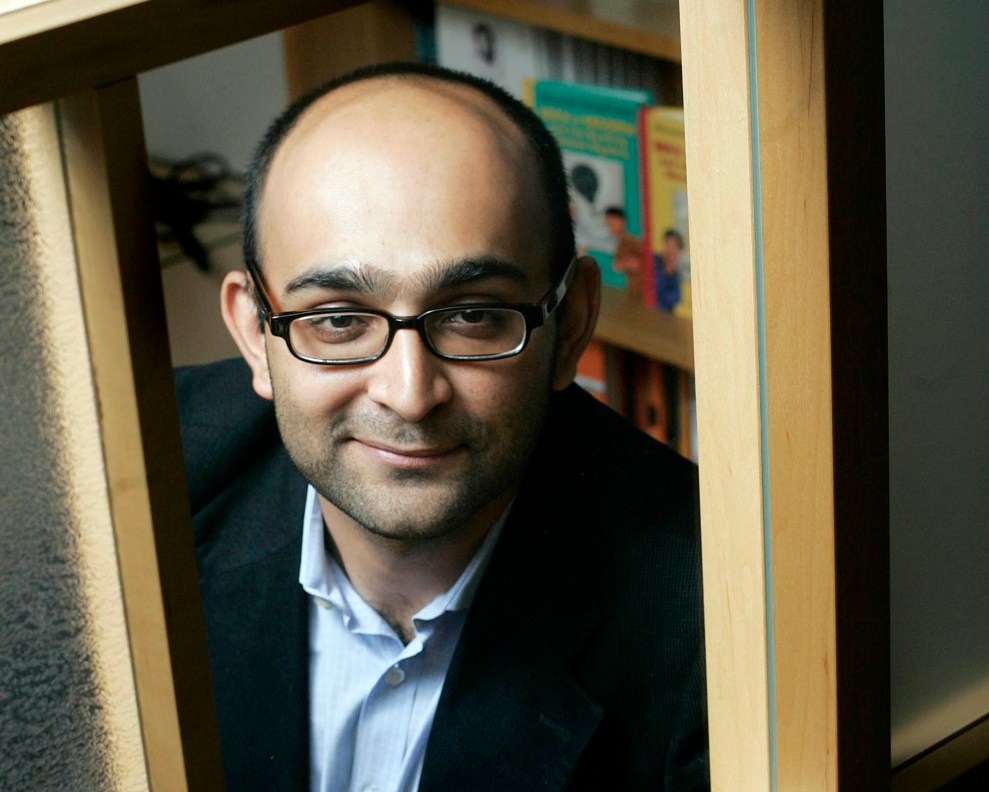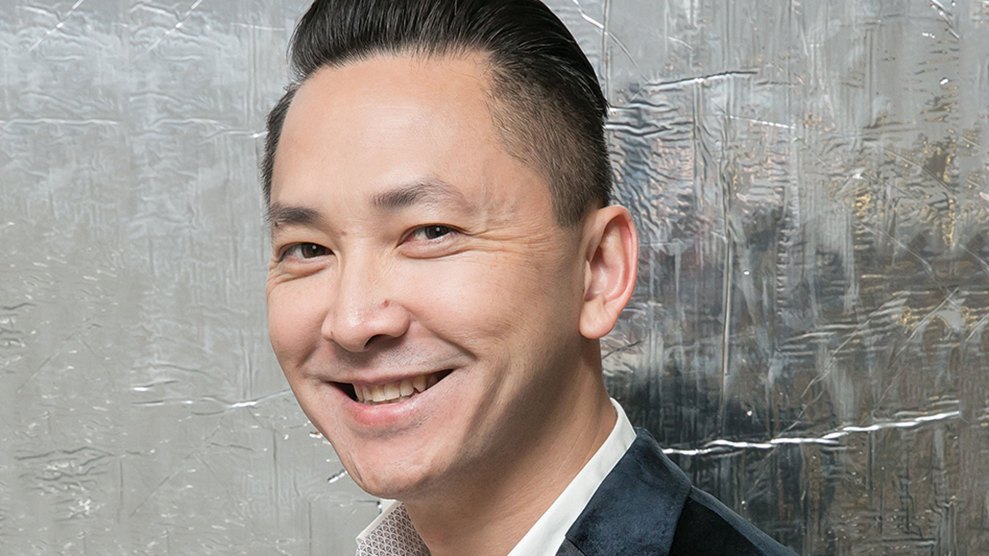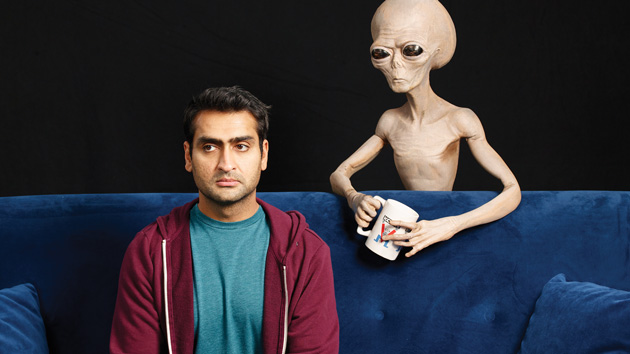
Tara Walton/Toronto Star/ZUMA Press
You can get through Mohsin Hamid’s latest in an afternoon. Not to suggest that Exit West, Hamid’s fourth novel, is frivolous reading. In just over 200 pages, he spans the globe as he tells the story of Nadia and Saeed, a young Muslim couple forced to flee an unnamed homeland—first to Greece and then to California. Falling in love as their city descends into conflict and chaos, the two eventually escape through magical portals, landing in refugee camps and squatters dens where they are confronted by nativist mobs. The crisis and the characters are fictional, but the circumstances feel almost journalistic. “It’s a love story,” Hamid assures me.
Exit West is, in fact, a classic boy-meets-girl tale, but like much of Hamid’s previous work it also tells a larger story of globalization and its discontents. With great compassion, he portrays the profound ruptures in a rapidly changing world. His characters are average people with average ambitions who bear the burdens of mobility—westward, upward, or forced. Given the anti-immigrant sentiment in Europe and the United States, it feels both urgent and much needed.
Hamid knows a thing or two about culture shock. He was born in the Pakistani city of Lahore, where he now lives with his wife and two children, a short drive from the Indian border. But he spent some formative childhood years playing on the manicured lawns of Palo Alto. Since releasing his first novel, Moth Smoke, in 2000, Hamid has won a Man Booker Prize, has had his work adapted for film and translated into 35 languages, and has been named one of Foreign Policy magazine’s “Leading Global Thinkers.” His novels, which also include The Reluctant Fundamentalist and How to Get Filthy Rich in Rising Asia, enjoy international acclaim and bestseller status. But Exit West may be his most prescient to date—an antidote of sorts (one can only hope) in this moment of xenophobic fear and mistrust.
Mother Jones: What was it like growing up between Pakistan and the United States?
Mohsin Hamid: When I was three, my dad went to do his Ph.D. at Stanford, so my mom and I moved with him and we lived in California for six years. I moved back to Lahore when I was nine, in 1980, and went back to the US for college and law school. I worked in New York for a while, then London for the better part of a decade. I have been back in Lahore for about seven years now.
MJ: Was there a sense of culture shock moving back and forth?
MH: There was pretty huge culture shock when I was nine! I had no memories of Pakistan. We hadn’t been back to visit in the six and a half years we’d been in California, and phone calls were expensive so I never really spoke to anyone. There was no internet. I’d never seen Pakistani movies or television, and I’d forgotten how to speak Urdu. So basically I was a Californian kid. I arrived in Pakistan completely unfamiliar with where I was going—and then utterly lost connection with where I’d just been. When I moved back, in 2009, with my wife and our daughter, it was still very strange. Maybe at a certain point, if you’ve moved around enough, everywhere feels a little bit foreign.
MJ: Do you consider Urdu your first language?
MH: This is the weird thing. My second language has become my first, and Urdu has become my second or third language. I started speaking at a very young age, a lot, but in Urdu. So in America, I go play outside in front of the townhouse by the Stanford campus where we live. All those townhouses look identical and I start crying. Outside the townhouse next to ours, the neighbor looks down at this befuddled Pakistani kid, and I’m looking at him like, “This is not my house! These are not my parents!” I’m surrounded by a bunch of kids and they ask my mother, “What’s wrong with him? Why can’t he speak?” She says, “He speaks fine.” And they say, “Is he retarded?”
For a month after that I didn’t speak a word. They were quite worried. I just watched cartoons. A month later, when I next spoke, I spoke in English with an American accent. I guess I spent a month somehow transitioning. It must have been quite traumatic to have made me silent for so long. Perhaps it’s shaped who I am, and my nomadic and multinational, multicultural view of life.
MJ: Were you drawn to books as a kid?
MH: Very early on. I was really into fantasy worlds and I loved stories—comic books in particular. My dad had this outlook: It doesn’t matter what I want to read—reading was a good thing. So whatever I was curious about they’d get for me from the library. Books were a kind of a resistance to reality. I liked to imagine worlds that were different. I still do.
MJ: Were there books or shows you couldn’t get in Pakistan because they were too salacious?
MH: Books, nobody bothered to censor them. You could find everything from full-on porn to soft porn in the guise of fantasy and sci-fi, and books like Lolita that had controversial sexual themes. There was much more censorship of images, though in the ’80s the VCR became quite popular, and you could get all the films you get in the US on pirated videocassettes.
MJ: What are the biggest misunderstandings between American and Pakistani cultures?
MH: The monolithic view that many Americans have of Pakistani culture is as inaccurate as the monolithic view that many Pakistanis have of American culture. In America there are people advocating for trans rights and people like Vice President Pence, who is vehemently opposed. In Pakistan, too, you have all kinds of folks—from flamboyant gay fashion designers and female Air Force pilots to the Taliban. A cross-dressed man used to be the top TV talk show host. It was actually quite radical. So the diversity of these societies is often lost on people. If an American teenager were to come to Lahore, they’d have wildly different experiences depending on whom they met. They could party and get drunk and smoke hashish with some, while others would say, “Let’s get some religious instruction.”
MJ: There’s been a lot of hand-wringing over the migrant crisis, but we seldom really get to know the refugees themselves. Did that factor into your reasons for writing Exit West?
MH: I’m not sufficient to act as their voice. But I thought it was important to imagine a narrative where a migrant was the hero, the protagonist, and enjoyed all of the narrative sympathies that come with that role. Because all over the world, the nativist perspective is being privileged over those who are more recent arrivals.
I also think massive migration is inevitable. As sea levels rise, as climate change happens, as fertile fields become arid, as wars are fought, people are going to move. They always have. I think we should be prepared, given environmental and political change for large-scale migration. If sea levels rise and 200 million people in Bangladesh and 300 million people in Indonesia need to move, and the entire Chinese seaboard, New York City—that’s going to be huge. So I thought it was important to imagine a future of immense migration and compress that into just a couple of years. And to imagine this future not as just a dystopian horror, but as something more complicated—that might even have elements of hope.
Partly, it’s our failure to imagine how change can be hopeful that empowers nostalgic narratives that try to take us back to the past in ways that are very dangerous.
MJ: People will inevitably call this a refugee story, but it almost seems like a love story first and foremost.
MH: In a way, all of my novels have been love stories. This one’s about young love, which two people as they grow and develop potentially leave behind. But also for the possibility of friendship to outlast the love. We’re not condemned to this titanic struggle of possession. This is about a different kind of relationship. I think all human stories are migration stories because everyone is a refugee from their own childhood. Even if you don’t move localities, time moves. The California of your childhood is over. So to say it’s a refugee story is true—and it’s also a love story. The notion of love as a potentially destructive and potentially redemptive human force is something that comes across in all my books.
MJ: So we should call you a romantic novelist?
MH: [Laughs.] In a weird way, yes! I’m not uncomfortable with the term. We think of the romance novel as a lesser form of literature, but I don’t think that’s true. Love is a very important aspect of human life and worth exploring. In Italian, the word for novel is romanzo, “the romance.” The English is “novel”—something new. Both of those elements, experimentation and love, are fundamental to the form.
MJ: Do you have any favorite love stories?
MH: I don’t have a single archetypal one, but for example, Charlotte’s Web is this beautiful story about love and death. Charlotte becomes kind of like a best friend for Wilbur, but also like a mother for him. That’s a novel about how love endures and how it makes weathering the experience of mortality more possible.
MJ: The discussion about migration right now seems to be dominated by fear. Is love the antidote?
MH: Also the need to empathize with, and insert oneself inside, experiences that are different than one has had. Literature and art and movies all play a very important role. They can help disarm this feeling. When we aren’t collectively imagining hopeful futures, then the way things are going almost invariably seems negative and frightening.
MJ: I understand you take walks to catalyze your writing. Your pace of publication has improved. Is walking to thank?
MH: It might be that I’m getting older. This novel felt quick to me—it took four years. But walking is very good for writers. There’s something fundamentally useful about not talking to anybody, not looking at a screen, and being in nature—even if that nature is an urban environment. It’s definitely helped me, especially when I’m completely stuck.
In that sense, the mobile phone is very dangerous. If you’re walking and looking at your phone, you’re not walking—you’re surfing the internet. If you keep your eyes open, walking is a meditative act. It’s so rare that we allow ourselves just to be. It’s a space in a day that we almost never carve out for ourselves. I think it’s very useful, like sleeping and dreaming, as something that’s important to my ability to write.
MJ: So you leave your phone at home?
MH: I keep it in my pocket. But I believe in digital detox. We’re all so terrified in the world right now partly because of the digital—that’s TV, radio, reading your favorite conspiracy theory blog. That stuff [activates] a sort of fight-or-flight response, and that’s not a state human beings feel good inhabiting. When I’m really plugged in I find it difficult to write. It’s like digging a well. If you make a void, something moves in to fill it. Writing books is like that. It’s mostly about freeing up time, doing nothing, and in that time some writing starts to happen. We need to figure out how to maintain those voids.
MJ: What’s it like to be in Pakistan living so close to India?
MH: Lahore is a very weird place in that sense. I can drive to the border in 30 minutes, walk across a line painted in the cement, and I’m in India. It’s bizarre. India to someone who lives in Lahore is like Queens to someone who lives in Lower Manhattan—it’s not far away, and yet it doesn’t exist. Lahore really is on a fault line. The animosity between India and Pakistan is deeply unfortunate and dangerous, and it’s something I’ve long campaigned to reduce. But right now, when there’s artillery being exchanged in Kashmir—which is not for from here, either—and there are 100-ish nuclear weapons on each side of the border, there’s never really been a case like this where two nuclear armed countries are happily shelling each other.
MJ: Was your family growing up very religious?
MH: There were differing degrees: Some people never did anything you would describe as outwardly religious, like praying or fasting. Others prayed five times a day. My mother has been to Mecca to perform her hajj; my dad hasn’t. I come from a very liberal family, so even the people who are outwardly religious tend to subscribe to gender equality, the importance of open-mindedness, all that stuff. My family is generally nonprescriptive.
MJ: Are you religious yourself?
MJ: It’s not something I like to talk about publicly. One reason is the politics, but also I think spirituality is deeply personal. My aunt used to say, “It’s between me and my god; it’s got nothing to do with you.” It was a good enough answer for me as a snot-nosed college kid angling for a religious debate, and I still think it’s a good way of putting it.
MJ: How do you feel about mandates on religious clothing?
MH: I’m not a fan. We should be very skeptical of people who want to place limits on how we express ourselves. If my daughter wanted to wear a headscarf and dress in a religiously conservative way, I would be heartbroken. But if she were to decide to do that and she were to live in a place where people said she couldn’t do that, I would be entirely committed to her right to do so. The ban on the burkini, which is basically a wetsuit, seems particularly ridiculous. We know nuns will wear something like that, and we know the bikini was only invented 50 or 60 years ago—people wore more clothing until recently. The ethnocultural connotations of the burkini ban are very strong. It’s as absurd as mandating that women have to go topless on the beach. If I were a woman, I definitely would not want to wear a burkini or a headscarf. But it’s not about what I want.















